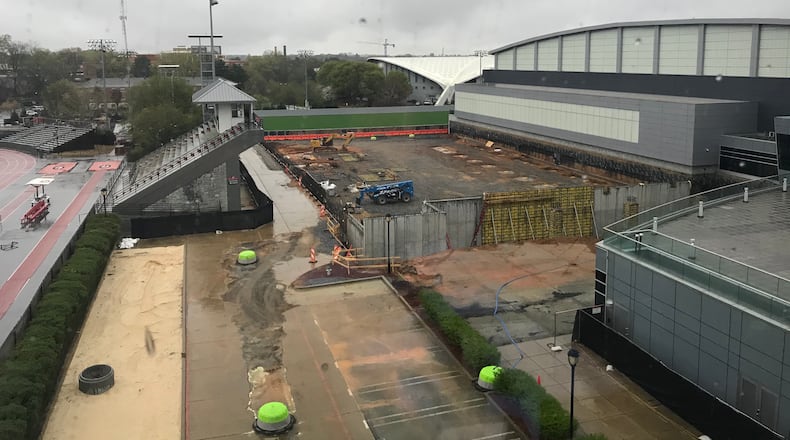Nobody was working Monday on the construction site of Georgia’s $80 million football-facility expansion. That was because of rain, though, and not the coronavirus pandemic.
The project that will provide a new home base for Kirby Smart’s Bulldogs continues. So far at least, health-care precautions that resulted in the evacuation of UGA’s campus and athletic facilities have not slowed Georgia’s progress in the ever-growing SEC football arms race.
“They’re able to work as (DPR Construction) directs them to work,” UGA Athletic Director Greg McGarity said Monday. “They’re following their own company’s protocol as far as when they work and social-distancing goes. But they have been working, pouring concrete and things like that. Right now, there’s not really a lot of intensive work because everything is below-grade right now. They’re coming out of the ground with concrete walls.”
The situation, McGarity allowed, might be different if the building was already out of the ground and electricians, plumbers and drywall technicians were all on site simultaneously. That’s not the case — yet.
UGA currently has two ongoing projects: the football facility and the concrete restoration project at Sanford Stadium. Both are continuing unabated.
Multimillion-dollar construction projects at the Dan Magill Tennis Complex and UGA Equestrian were completed earlier this year.
But the immediate future of football – the financial engine that powers UGA athletics — remains very much in question. All spring sports were shut down for the year Tuesday.
That included spring football practice. It remains increasingly doubtful that the 15-practice session allowed for football by the NCAA will resume. McGarity wasn’t about to speculate on that.
The larger question looming is whether college football will be played at all next season. Georgia is scheduled to open the season Sept. 7 against Virginia in the Chick-fil-A Kickoff game at Mercedes-Benz Stadium. This weekend, Cavaliers coach Bronco Mendenhall told reporters that, if the pandemic shutdown is extended, there has been discussion of playing a truncated season that might include only conference games.
McGarity said UGA and the SEC isn’t considering anything of the sort at the moment. They remain hopeful that the football season will proceed as planned.
“You don’t know right now if you’re talking about a full season, a partial season, the start of the season moved back,” he said. “There are just so many unknowns. Rather than focus our resources and energy on hypotheticals that could vary for months, we want to dedicate our efforts and time toward helping our young people with what lies straight ahead.
“And our coaches, too. They’re wanting to know specifics as well. We all do. But at this time that’s just impossible to nail down unless the medical professionals and the government come out with some new information that could give us some new timelines. We’re living in the world of the unknown right now.”
To be sure, cancellations or postponements of any football games would be a significant financial hit for UGA’s athletics department. Football accounts for the vast majority of the Bulldogs’ athletic revenues. Fiscal Year 2020 ends June 30.
The uncertainty comes at a bad time for Georgia athletics. The deadline to submit donations for season tickets is fast approaching. The Bulldogs recently extended it a week to April 6.
But that might not be enough time for individuals who might be incurring financial instability or experiencing job insecurity.
“We were well underway,” McGarity said. “We’re working with those who might need financial assistance as far as how they may for tickets. We have a system in place to deal with that as well. If there are hardships, we have staff that are dedicated to helping our supporters through that.”
UGA has a streak of 79 consecutive sold-out home football games bolstered by nearly 60,000 season-ticket holders. McGarity said so far they haven’t seen a significant drop-off.
“We typically don’t have a lot of turnover in season tickets because of the loyalty of our fans,” McGarity said. “I’m sure there will be some. We won’t really know until the middle of April what impact this has made on football tickets next year.”
Georgia hasn’t incurred much in the way of lost revenue so far. The only real income produced in the spring is baseball, and that’s nominal.
In the meantime, UGA's campus is a virtual wasteland. McGarity’s car was the only one in the parking lot of the Butts-Mehre Heritage Hall on Monday morning.
“We’ll be tackling issues as they arise and do our best to stay ahead on planning and legislation,” said McGarity, who continues to participate in daily conference calls with the SEC and NCAA. “Right now our full focus is on our student-athletes and preparing for the university to resume classes next week. So, that’s our foremost issue right now, supporting these kids for the rest of the semester.”
Some students remain in Athens, many have returned to their homes. Classes have been halted since March 6 when UGA dispersed for spring break until March 30, when they are to resume online. Online classes that were already underway have continued, McGarity said.
“Everybody has to realize we have been under this (stoppage) only for a week,” McGarity said. “It seems like it’s been a month, but we’re just starting our new way of operating, the second week of what we expect will be many weeks. So there are a lot of other things that have been prioritized right now. It’s a little early talk definitively about something that may or may not happen.”
About the Author
Keep Reading
The Latest
Featured


